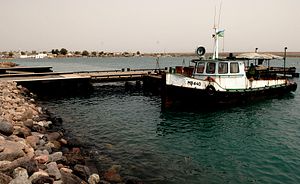Your weekly round-up of China news…
Want China Times has the juiciest story of the week, with its report that the United States is being ordered to vacate the town in Djibouti that China is eyeing for a military base. Citing Global Times and Counter Punch, Want China Times says that “Djibouti reportedly ordered the U.S. to vacate the Obock military base so that it can be turned over the People’s Liberation Army.” The United States’ actual permanent base in Djibouti is at Camp Lemonnier; Obock is a port city with an existing airport and naval pier.
Washington is reportedly deeply concerned about the move, which would give China its first-ever overseas base — one that incorporates U.S.-built facilities. In 2009, the U.S. unveiled a new, $14 million naval pier facility in Obock, with both civilian and military sections. “The military portion includes a 90-meter maritime platform, a head office, an administrative and berthing structure, fully-automated gas and firefighting systems as well as water and fuel storage facilities,” the U.S. Combined Joint Task Force – Horn of Africa reported at the time.
Neither this report nor earlier ones have been confirmed by official government sources from either China or the United States – in fact, China has repeatedly refused to confirm reports that it is seeking an overseas military base – so take this with a grain of salt. Our most official confirmation came in May, when reports cited Djibouti’s president as saying that China is in talks with the African country regarding basing arrangements.
In other news, Bloomberg looks into a much-discussed Chinese project to build a canal across Nicaragua. The $50 billion project would connect the Atlantic and Pacific Oceans, providing a more modern rival to the Panama Canal – if it ever comes to fruition, that is. Michael McDonald, doing on-the-scene reporting for Bloomberg, says little to no work is being done at crucial points earmarked for initial development.
The New York Times notes that China ‘s currency, the renminbi, was left out of the International Monetary Fund’s basket of currencies again this year, despite a big push for its inclusion. It will get another chance in September 2016. Over at Foreign Policy, Scott Kennedy offers an argument in favor of the RMB joining the world’s most exclusive currency club. In essence, Kennedy argues that inclusion in the IMF’s special drawing rights basket confers no tangible benefits — but would require financial reforms from China. “The international community would be getting something for nothing, and, no matter how you count it, that is a good deal,” he writes.
As I reported earlier this week, South Korean President Park Geun-hye will travel to Beijing from September 2-4 to take part in events celebrating Japan’s surrender in 1945. There have also been some tantalizing reports that Japanese Prime Minister Shinzo Abe will also head to China on September 3 for a meeting with Chinese leader Xi Jinping. But China’s Foreign Ministry shot down those rumors, saying it “has not heard of Japanese Prime Minister Shinzo Abe’s September visit to China.” The ministry clarified that Abe has been invited to the “the ‘September 3’ commemorative activities,” but not (it’s implied) for a separate summit. Japanese media reports had suggested Abe would skip the commemorations and arrive in the afternoon.
Finally, check out Peter Mattis’ “Guide to Chinese Intelligence Operations” on War on the Rocks. From cyber espionage to more traditional intelligence work, Mattis looks at what China is doing and how.

































